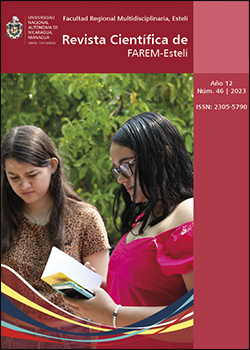Obstacles and facilitators present in the teleconsultation provided at the Military Hospital, Managua, Nicaragua, 2022
DOI:
https://doi.org/10.5377/farem.v12i46.16474Keywords:
Teleconsultation, telemedicine, obstacle, facilitatorAbstract
Teleconsultation has become an increasing valuable method for the provision of health services and has gained importance since the Covid-19 pandemic. In its implementation, obstacles to its effectiveness arise, but, at the same time, there are facilitators that enhance its adoption and use. Therefore, understanding these obstacles and facilitators is crucial for the success and sustainability of teleconsultation. The present research was conducted with the objective of identifying obstacles and facilitators in teleconsultation as a virtual care modality in the Hospital Militar Escuela Dr. Alejandro Dávila Bolaños (HMADB), Managua, Nicaragua in the period from October to December 2022. The research was conducted with a qualitative-quantitative approach, generating a descriptive, cross-sectional study. Data were collected by applying a 22-question survey to determine the socio-labor characteristics of the sample, determine the perceived obstacles and facilitators, and describe the degree of satisfaction of the professionals involved; the instrument was applied to 36 physicians working in teleconsultation. The results reflect that 30.6% of the physicians indicate that teleconsultation at HMADB arose as a result of the pandemic in order to guarantee patient safety and, since then, they highlight that the main barriers are the absence of training and lack of knowledge of the virtual health standard. On the other hand, among the facilitators, they mention the alignment of teleconsultation with institutional objectives, the sustainability of the project, and the ease of use of ICTs. To maximize the quality of the service, the institution should correctly manage the obstacles and facilitators encountered, seeking to increase the satisfaction of the professionals involved in the teleconsultation and, in due course, to implement it in other healthcare areas.
Downloads
References
Organización Panamericana de la Salud. (2016). Revisión de estándares de interoperabilidad para la eSalud en Latinoamérica y el Caribe.
QMENTUM International. (2019). Accreditation Canadá: Estándar de Salud Virtual.
Roig, F., & Saigí, F. (2011). Elementos facilitadores en la implantación de servicios de telemedicina. Perspectiva de los profesionales implicados en su diseño y puesta en marcha. Estudios de Ciencias de la Salud, Universitat Oberta de Catalunya, 10.
Schreiweis, B., Pobiruchin, M., Strotbaum, V., Suleder, J., Wiesner, M., & Bergh, B. (2019). Barriers and Facilitators to the Implementation of eHealth Services: Systematic Literature Analysis. J Med Internet Res, 21(11). Recuperado de https://www.jmir.org/2019/11/e14197/
Tabares, M., Vélez, C., Giraldo, A., Morales, J., Mota, M., & Saigí, F. (2020). Determinantes de la intención de uso de la telemedicina en pacientes y médicos en Caldas, Colombia. Ciencia e Innovación en Salud, 463-473.
Trejos, M. (2022). Análisis de la implementación de la teleconsulta para la atención de las personas en la pandemia por SARS-COV 2 en el periodo 2019 - 2021 a nivel nacional e internacional. Tesis de Postgrado: Universidad de Costa Rica.
Van den Wijngaart, L., Geense, W., Boehmer, A., Brouwer, M., Hugen, C., Van Ewijk, B., . . . Merkus, P. (2018). Barriers and Facilitators When Implementing Web-Based Disease Monitoring and Management as a Substitution for Regular Outpatient Care in Pediatric Asthma: Qualitative Survey Study. J Med Internet Res, 20(10).
Published
Issue
Section
License
Copyright (c) 2023 Revista Científica de FAREM-Esteli

This work is licensed under a Creative Commons Attribution-NonCommercial-ShareAlike 4.0 International License.



